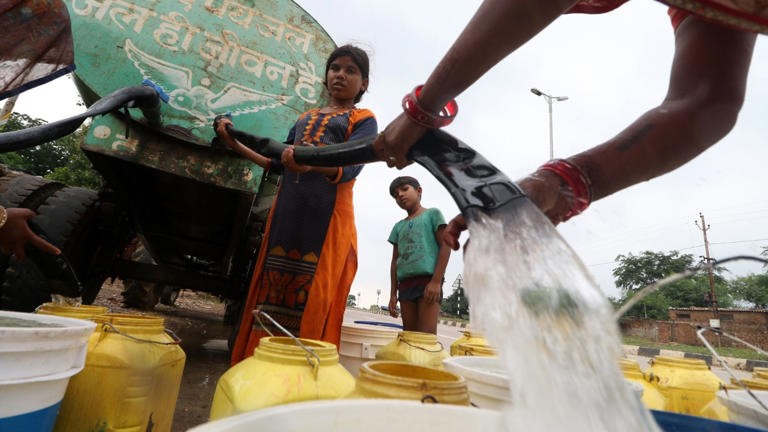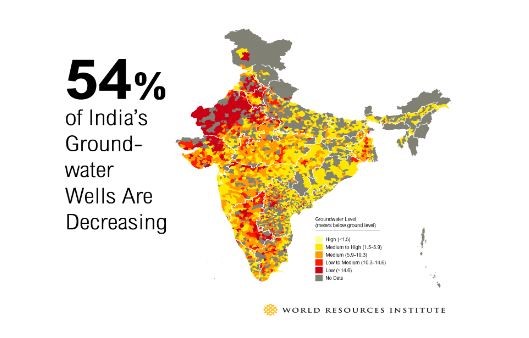Description

Disclaimer: Copyright infringement not intended.
Context
- With Bengaluru facing severe water shortage, many have compared the city’s predicament to Cape Town’s in 2015-18.
Causes of the water shortage in banglururu
Low rainfall
- The crisis in Bengaluru is caused by scanty rainfall in the Cauvery basin — which accounts for 60% of the city’s water supply — and the depletion of its groundwater reserves.
- Like in Cape Town, Bengaluru’s water reservoirs have fallen to critically low levels due to this.
Urbanization
- Beyond low rainfall, rapid, unplanned urbanization has played a significant role in the crisis in both Cape Town and Bengaluru.
- As the city expanded, existing water infrastructure (reservoirs, pipelines, and treatment plants) struggled to keep up with demand. This strain then resulted in leaks and other problems and led to inefficient water use.

Concretization of floors
- As concrete covered increasing swathes of land, groundwater levels fell drastically, with replenishment not keeping up with consumption.
Inadequate Infrastructure
- The city's infrastructure, including water supply systems and sewage networks, has not kept pace with its rapid growth. This inadequacy exacerbates the challenges of distributing water efficiently to meet the demands of the expanding population.
- The anticipated completion of Phase-5 of the Cauvery project, designed to provide 110 liters of drinking water daily to 12 lakh people, is expected by May 2024.
Destruction of water bodies
- In the 1800s, the city had 1,452 water bodies, with roughly 80% of its area covered in greenery. Now, only 193 water bodies remain, and green cover is below 4%.
- With tech parks, gated communities, and high-rise apartments covering the once-green stretch of land, simply not enough water is percolating underground.
Mismanagement and Inequitable Distribution
- Inefficient water management practices, including wastage, leakage, and unequal distribution of water resources, contribute to the severity of the water scarcity crisis, with some areas receiving inadequate or irregular water supply.
Government Schemes To Tackle The Groundwater Crisis in India
- MGNREGA: Supports water conservation through rural employment.
- Jal Kranti Abhiyan: Raises awareness on water conservation.
- National Water Mission: Promotes sustainable water management.
- Atal Bhujal Yojana (ABHY): Improves groundwater management.
- Jal Jeevan Mission (JJM): Aims to provide tap water to rural households.
- National Mission for Clean Ganga (NMCG): Addresses Ganga basin groundwater issues.
|
Case of The Cape Town water crisis
●Cape Town faced a serious water shortage between 2015 and 2018, which peaked around 2017. It was characterized by critically low levels of water in the city’s reservoirs, threatening to completely exhaust the city’s water supply, and forcing authorities to implement strict water-rationing measures.
●The scarcity was such that the prospect of “Day Zero” — the day when municipal authorities would effectively cut water supply due to empty reserves, and residents would have to queue up for a daily ration of water — defined life in the city. This would have made Cape Town the first major city in the world to “run out” of water.
●The crisis was caused by a prolonged period of below-average rainfall, resulting in a drought across the Western Cape. This resulted in the water levels in Cape Town’s reservoirs dropping significantly. A rapidly growing population, unplanned urbanization, and inefficient water-use practices further strained the city’s water supply.
●Like in Cape Town, Bengaluru’s poor are the worst hit in the crisis, with increased health risks arising due to the lack of water for sanitation and hygiene purposes. Images of residents queuing up to collect water from public taps and tankers have dominated the news in Bengaluru this year, just as they had during the Cape Town crisis.
|
Efforts taken to resolve the water crisis?
- The Bengaluru Water Supply and Sewerage Board (BWSSB) has banned the use of potable water for washing cars, gardening, swimming pools, construction activities, road maintenance, entertainment, etc. The board has announced a penalty of Rs 5,000 for violators.
- The Karnataka government has banned the use of drinking water for gardening and other purposes.
- It has ordered a supply of water in huge tankers to Bengaluru from adjoining towns.
- A substantial budget of Rs 131 crore is allotted by civil bodies for drilling borewells in priority zones.
- To control water prices, all private water tankers and borewells are instructed to register with the BWSSB.
- In the 2024-2025 budget speech, CM Siddaramaiah announced that the BWSSB would start Phase 5 of the Cauvery project, aiming to provide 110 liters of drinking water daily to 12 lakh people. The project is expected to be completed by May 2024.
- Karnataka Water Policy 2022 suggested strategies like recycling, re-use of treated wastewater and rainwater harvesting, industrial water use planning, and other such measures.
Status of the water crisis in India as per NITI Aayog
- The NITI Aayog report projected the country’s water demand to be twice the available supply by 2030, implying severe scarcity for hundreds of millions of people and an eventual loss in the country’s GDP.
- The rate of depletion of groundwater in India during 2041-2080 will be thrice the current rate with global warming, according to a new report.
- Across climate change scenarios, the researchers found that their estimate of Groundwater Level (GWL) declines from 2041 to 2080 is 3.26 times current depletion rates on average (from 1.62-4.45 times) depending on the Climate model and Representative Concentration Pathway (RCP) scenario.

Source: https://indianexpress.com/article/explained/explained-climate/bengaluru-and-cape-town-a-tale-of-two-cities-hit-by-water-scarcity-9253919/
|
PRACTICE QUESTION
Q. Critically Evaluate the severity of the groundwater crisis in India concerning the recent Bangalore water crisis and suggest effective strategies to mitigate its impact.
( 250 words)
|











